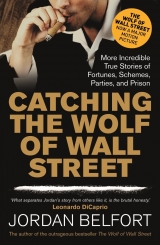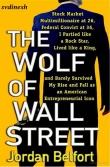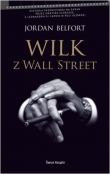
Текст книги "Catch the Wolf of Wall Street"
Автор книги: Jordan Belfort
Жанр:
Биографии и мемуары
сообщить о нарушении
Текущая страница: 7 (всего у книги 33 страниц)
I paused, letting Elliot's words hang in the air. Then I said, “There's no denying that he had a point. You see it in jewelry stores all the time: They inflate their price tags and then mark things down right in front of you so you think you're getting a good deal.” I paused again, then: “And all this business about an overorder isn't much different than all those stores you see advertising ‘ going-out-of-business sales.’ Most of them have been advertising the same going-out-of-business sale for the last ten years, and in ten more years they'll stillbe going out of business!”
I took a deep breath and continued: “Anyway, we spent most of the first day working middle-class neighborhoods, knocking on people's doors and ringing their bells. And the rejection was absolutely staggering. Doors were being slammed in our faces left and right, with people telling us to basically drop dead. By two o'clock, Elliot was getting negative. He started whining to me, ‘Nobody wants the food today.’” I shook my head and let out a few chuckles. “It was sad to see. I mean, the poor bastard was on the verge of tears! At the beach, everyone loved us; we were almost like celebrities there. But here we were being treated like lepers.
“Still, the Penguin somehow managed to unload twelve boxes that day, and the next day he unloaded sixteen.” I nodded slowly, still impressed at his persistence. “One thing I can tell you about the Penguin is that he's a relentless bastard. He kept waddling from door to door, knocking and knocking until his knuckles were bleeding, even as he snuffled back the tears. But he was averaging three hundred dollars a day in commission, so it was worth a few tears. I mean, that was a lot of money back then, especially to a kid who'd just dropped out of dental school. So, fuck it, I thought. In spite of knowing it was a little bit of a hustle, I figured I'd give it a whirl.”
I paused and looked at OCD. “You wanna guess what happened next?”
OCD smiled and shook his head a few times. “I could only imagine.”
“Actually,” I said, “you probably couldn't, because no one at the Great American could. You see, since price seemed to be everyone's biggest objection, I figured, why not try selling to rich people? Or, better yet, to rich people I knew.The problem was that I didn't really know any rich people—except for the father of my girlfriend from college, David Russell. But that was a sticky situation, because he and his wife had just gotten separated and I didn't know where he was living. She, I knew, was still living in the mansion up in Westchester, but I couldn't just go knocking on her door. She never really liked me, although I can't imagine why.” I looked at the Witch and said, “What's not to like, Michele, right?”
The Witch didn't speak or smile; she simply raised her thin left eyebrow high on her forehead, as if to say, “Are you fucking kidding me?” I shrugged and said, “Well, I guess she had her reasons. But, that aside, I did the next best thing and went to her next-door neighbor.” I nodded a single time, implying the righteousness of my decision. “Yes,” I said proudly, “I pulled my Toyota pickup truck right up to her neighbor's enormous front door and hopped out and started knocking. I remember it like it was yesterday. The house was an enormous white colonial with forest-green shutters; and the front door was bigger than the one that led into the Emerald City. It was painted barn red and had a thousand coats of lacquer on it. And I kept rapping on it until, finally, after a minute, a kind-looking sixtyish woman, with gray hair and granny glasses, came to the door and said, ‘Can I help you, young man?’
“I offered her a sad smile and said, ‘Maybe you can, ma'am. My name is Jordan, and I deliver meat and seafood to some of your neighbors in the area. I have an overorder on my truck today, and I can't get back to the freezer. I'm willing to sell you everything at cost.’ I flashed her my big blue puppy-dog eyes and added, ‘Is there any way you can help me out, ma'am?’
“She stared at me for a few seconds, and then, in a tone ripe with skepticism, she said, ‘Which neighbors do you deliver to?’ Without missing a beat I answered, ‘To the Russells next door.’ Suddenly it occurred to me that she might actually call over there, so I quickly added, ‘Actually, it was to Mr. Russell—to David, as he liked to be called,’ and then I compressed my lips and nodded sadly. ‘But, you know, with all that's going on over there with the divorce, they haven't been buying much meat lately.’
“The woman was very sympathetic to that, so her tone immediately softened. ‘I can only imagine,’ she said sadly. ‘It's a terrible thing, divorce.’ Then, suddenly, she perked up and asked, ‘Well, what do you have on the truck today?’ I lifted an index finger and said, ‘Hold on, I'll be right back,’ and I ran out to the truck, grabbed one of everything, and came lumbering back with a dozen boxes. I had them stacked twelve high, towering a foot over my head.
“When I reached the front door, the woman said, ‘It's freezing outside; why don't you bring those into the foyer?’ She motioned toward a gray marble foyer that was big enough to land a plane in. ‘Uh, um, thank you,’ I said, letting out a couple of obvious grunts and groans. ‘These boxes are really heavy.’ Then, as I walked past her, I added, ‘You're right about it being freezing outside; it's absolutely brutal!’ And I dropped down to my knees and let the boxes hit the gray marble floor with an exaggerated thud.” I paused and took a moment to regard my captors.
They seemed shocked more than disgusted over the wonderful string of fibs I had told this kind old woman. What they had no idea of, though, was that the greatest fibs were yet to come. Of course, I knew I shouldn't plunge into the gory details of how I had convinced this kind old woman to buy all forty boxes of meat on the truck. This wasn't the sort of thing that my captors would respect, but I just couldn't seem to stop myself. I was getting an irrational joy by flashing back to the days when I was still a budding salesman. Besides, while I was busy talking about the past, I had no time to focus on the present, which is to say, the grim reality that had become my life. So I soldiered on, with relish.
“Well, I gotta tell you,” I said with a bit of cockiness slipping out around the edges, “there are only a handful of defining moments in a young man's life, moments where something so extraordinaryhappens that he knows things will never be the same again.” I paused for effect. “And this was one of them. I'd hustled ices on the beach before, but that wasn't really selling; it was more about working hard and having the desire to succeed. And even my little auction at dental school wasn't really salesmanship, although it was definitely one step closer.
“But when I looked up at this kind woman's smiling face, well”—I added a hint of the supernatural to my tone—”a strangefeeling washed over me, almost magical, in fact. It was as if I knew exactly what this woman needed to hear—or, better yet, exactly what I needed to say to her to convince her to buy everything.
“I opened the first box and raised my palm toward twelve beautiful filet mignons, each individually wrapped in clear plastic. ‘Black Angus filet mignons,’ I said proudly, ‘inch and a half thick. They've been flash-frozen and Cryovac-ed to near perfection; they'll last up to twelve months in your freezer, ma'am.’ I nodded proudly, shocked at how easily the bullshit was rolling off my tongue. ‘Restaurants broil these for seven minutes on each side and then serve them with béarnaise sauce.’ Then I looked her right in the eye and said with the utmost conviction, ‘They're so tender you can cut them with a plastic fork.’ Then I moved the box to the side and went on to the next one. ‘South African lobster tails,’ I declared. ‘Split them down the back, brush them with butter and garlic, and twenty minutes later you got yourself a surf and turf
“And I went on and on, spitting out a little rap about each product and then saying I had three of these on the truck or four of those on the truck. Finally, when all the boxes were open and we were literally surrounded by meat and fish, I pointed to the prices and said, ‘I'll take fifteen dollars off each box, which is my absolute cost. Believe me, you can't even getthis food in the supermarket! That's how good it is.’
“After a few moments she said, ‘Well, I'd love to help you. I mean, you seem like such a niceyoung boy. But it's only my husband and me. I wouldn't have use for so much food.’ She thought for a second then said, ‘Besides, I hardly have any room in my freezer.’ She shrugged sadly. ‘I'm very sorry.’
“I looked up at her and nodded slowly. ‘I totally understand that, but let me say this: I happen to be a professional freezer packer, and I'm willing to bet I can shuffle things around a bit, maybe even clean things up in the process. And not only will I pack your freezer for you, but I'm alsowilling to walk your dog and mop your floor and mow your front lawn and paint your house’—I raised both my palms toward her—‘not that it needs it or anything, but what I'm trying to say is that I'll do whatever it takes to sell the food today.’ I compressed my lips for effect. ‘See, if my food ends up thawing out, I might lose my job, and I can't afford for that to happen. I'm trying to put myself through college.’ Suddenly a wonderful thought came bubbling up into my brain. I bit my lower lip and said, ‘Do you have grandchildren, by any chance?’
“Well, the woman fairly beamed at the question. I think I made her day, in fact. ‘Oh, yes,’ she answered with a smile. ‘I have five of them; they're very wonderful.’ I smiled and said, ‘I'm sure they're very precious. So why not throw a great big barbecue for them? It would be a terrific excuse to get the whole family together. And then you can tell everyone about this nice young boy who came by and sold you all this wonderful food! You can even give them doggie bags to bring home.’ I raised my eyebrows and nodded eagerly. ‘In fact, I'll even deliver the food to them! Just call me back, and I'll come by with my truck.’
“She mulled it over for a few seconds, then said, ‘Okay; I have an extra freezer in the garage. You can put it in there.’
“ ‘Oh, my God,’ I declared. ‘Thank you so much, ma'am. You saved my life! What would you like? I have all sorts of prepared foods too. I have chicken Kiev, chicken cordon bleu, crab thermidor, which happens to be especially delicious,’ and it also happens to be my highest markup item, I thought.
“The woman smiled at me and said, ‘I guess I'll take everything. I mean, I wouldn't want you to lose your job, right?’”
I paused and leaned back in my seat and stared at the Bastard. “And that's how simple it was. She bought the whole fucking truck from me right on the spot!” I shrugged my shoulders. “Of course, I felt a bit guilty about having lied to the woman, but the food, well, it was top-notch, not to mention the fact that I'd single-handedly inspired her to throw a family reunion. So it was all good, right?”
“Yeah, it was all good,” snarled the Bastard.
I ignored his sarcasm. “Right, it was all good. In fact, it was sogood that my first week on the job I sold two hundred and forty boxes—which was more than twice the company record. And that was how it started. From there, a bizarre chain of events led me into the stock market and then to Stratton. Let me take them in order.”
The Bastard nodded a single time. “Please do.”
I nodded back. “It started with the Great American office. It was as if the entire sales force suddenly caught fire. Everyone's production doubled, some even tripled. It was as if I'd raised the bar or opened a new realm of possibility as to how much money could be made if you worked hard and sold the right way. Within a week, the manager came to me and asked if I'd help train the new salesmen. The manager was P. J. Cammarata. He kept saying, ‘You pumped up the office, Jordan. It's pumped beyond belief now…’ and blah, blah, blah. He kept going on about how the pump was everything.” I paused, shocked at how clear my memory of this was. “In retrospect, it was the only intelligent thing he ever said. See, the pump iscrucial; without it, a sales force withers away and dies quicker than you can imagine.”
“So you agreed to train the salesmen?” asked the Bastard.
“Yes, but for selfish reasons. I was already planning on starting my own company; it was only a question of when. I figured I'd buy my own truck, go down to the meat market, and make the wholesale markup too. It's what I had done at the beach all those years, and it'd worked like a charm.” I shrugged. “So I began to train the salesmen and quickly realized that I had a knack for it. In fact, I was so good at it that I could take virtually any kid off the street and turn him into a meat salesman.
“A few weeks after that, P.J. asked me if I would give a sales meeting to the office, to take the pump to the next level.” I paused, thinking back for a moment. “It's rather ironic that it would be a dimwit like P.J., with his dirty jeans and tan Members Only jacket, who would instigate one of the defining moments of my life. See, above all, it's my ability to speak before the crowd-giving sales meetings to the Strattonites—that was at the heart of my success. It's what kept the pump going all those years, despite all the regulatory problems we were having.”
“The meetings?” the Bastard asked open-endedly.
“Yes, the meetings. It's what separates—or, should I say, separated—Stratton from every other brokerage firm in America. Twice a day I would stand before the boardroom and preach to the brokers. No one on Wall Street had done that before. Occasionally a brokerage firm would bring in a guest speaker—someone like an Anthony Robbins type—but it was always a one-shot deal, not as part of a program. And that's a complete waste of time, to do it once. If you want results, you have to do it every day; and if you reallywant results, you have to do it twice a day, once in the morning and once in the afternoon. Then miracles can happen.
“But, of course, I wasn't aware of that back in my Great American days… although I willtell you that the first meeting I gave was a real eye-opener. It took place inside the warehouse, in Forest Hills, Queens. There were twenty salesmen there, most of them in their early thirties. They were all dressed in jeans and sneakers, trying to look like truck drivers. They were gathered around in a circle, and I was standing at the center. At first I started speaking slowly, talking about the quality of the food, how amazingit was, how there was nothing else like it, and how lucky our customers were to have access to it. In hindsight, I was laying the foundation for a cult, although back then I was doing it without even knowing it. And the fact that—”
OCD held up his hand. “What do you mean, ‘laying the foundation for a cult’?”
I looked at OCD and said, “Let me put it this way: At the heart of any cult—whether it's Stratton Oakmont or Great American or those crazy Branch Davidians from Waco, Texas—is the fundamental belief that, in spite of what the rest of the world might be saying about them, everyone else is crazy and they're sane. And, without exception, it always starts with a belief in the justness of their cause. With Muslim extremists it's a warped interpretation of the Koran; with the Branch Davidians it's a warped interpretation of the Bible; and at Stratton it was the boardroom itself, the great equalizer in an otherwise unfair world. In other words, it didn't matter what family you were born into or how limited your education was or how low your IQ was; once you stepped into the Stratton boardroom, all that was behind you. You became equalized; you could make as much money as the most powerful CEO in America.” I shrugged my shoulders, as if this were basic stuff.
“All cults draw their power by advancing a concept like that– that they have some sort of one-up on the world. With Great American it was having food you couldn't get in the supermarket, and with Stratton it was the promise of becoming rich, in spite of the fact that you were a high school dropout who deserved to be working the checkout line at Seven-Eleven.” I chuckled ironically. “That's why I said before, ‘Give them to me young and stupid, young and naive.’ Because they make much better cult members.
“Anyway—back to my first meeting—after a few minutes of selling the salesmen on how great the food was, the words began gushing out in torrents. Perfect strings of thoughts came pouring out of my mouth. Before I knew it, I was literally preaching, going on and on in intimate detail about things that had never even occurred to me before. Yet I still sounded like I was the world's foremost expert on them: things like the difference between winners and losers, and the power of positive thinking, and being the master of your own destiny.
“Then I started getting technical, and I plunged into the art of selling—explaining how to open and close a sale; how to modulate the speed and tone of your voice to keep people interested; and the importance of being relentless, of not taking no for an answer and knocking on doors until their knuckles bled. ‘You owe it to yourselves!’ I said to them. ‘You owe it to yourselves, you owe it to your families, and, most importantly, you owe it to the people whose doors you're knocking on, because the food is so amazing that every last person who buys from you will be eternally grateful!’
“I can't overstimate how baffled I was at my own ability to speak like this. It was completely effortless; and the gratification was instant.I could see it in the eyes of every salesman there. They loved it, and they loved me.And the longer I spoke, the more they loved me.
“Over time, I found that giving meetings filled a hole inside me. It was simply the most amazing feeling ever; you can't even begin to imagine.” I smiled sadly at the memory. “But, of course, like everything else, I became desensitized to it. Eventually, even at the height of Stratton, when I was giving meetings to a football field full of brokers, I no longer got the same rush from it. So the hole grew larger.” I paused, letting the implications of that sink in. Then I said, “So I turned to other things, like drugs and sex and living life on the edge. By the early nineties the word on Wall Street was that I had a death wish. But I never looked at it that way: I thought I was living life as it unfolded; putting one foot in front of the other and walking down a preordained path. But the path turned out to be the path to my own destruction, and it was being laid down by my own actions.”
No responses. The debriefing room was dead silent now. In fact, you could have heard a pin drop. I continued with my tale: “I still remember the looks on the salesmen's faces as if it were yesterday. But the face that sticks out most is Elliot's. He was totally mesmerized. He looked like he was getting ready to run out of the warehouse right that second and start knocking on doors. That's how much the meeting affected him, and that's how much it affected our relationship. You see, before that, we considered each other equals, but after the meeting we had a silent understanding that Iwould be the one calling the shots now.
“It was maybe two weeks later when I approached him with the idea of opening up our own meat-and-seafood company. ‘Why pay Great American twenty dollars a box,’ I said, ‘when we can go down to the meat market ourselves?’
“But the Penguin was sobrainwashed, he actually said, ‘But what about the food? Where are we gonna get food as good as Great American's?’”
I chuckled at the memory. “Can you imagine? I mean, this guy was so brainwashed that he'd actually convinced himself that Great American's food was so good that he couldn't go door to door without it. It was almost laughable. I mean, yeah, their food was good, but it was only good;it wasn't great!The steaks were choice, not prime, and the fish was frozen, not fresh. So I had to deprogram the Penguin from the Great American cult.
“I let him down easy—sort of. ‘What the fuck is wrong with you, Penguin? The food is just average, for Chrissake! So get a fucking grip.’ Then I smiled at him warmly and said, ‘Listen, we'll find even bettersteaks than Great American, and we'll find fresher fish too. Then we'll hire salesmen of our own—to go door to door for us—and then we'll get rich!’
“That's how Elliot and I got into the meat-and-seafood business. And we had the perfect plan: It was almost summertime, so we would sell ices during the day and tie up all the loose ends of our business venture at night. And with the money from the beach, we'd finance our meat-and-seafood company. We even brought in another beach vendor to partner up with us, our friend Paul Burton.” I motioned to my list again. “He's on there too,” I said casually. “Paul was living with his mother at the time, in a big white house in Douglaston, Queens, and, by coincidence, the house had a big backyard, just perfect for a meat-and-seafood company. Or so we thought.
“See, despite Douglaston being a very upscale neighborhood, Paul's house was a shithole. His mother had gotten it in a divorce, about twenty years earlier, and she hadn't put a dime into it since. It was almost like a haunted house now, and the backyard was no better. It had a freestanding garage surrounded by nothing but dirt, about a half acre of it.” I smiled nostalgically. “Still, it was absolutely perfect for us. We were budding entrepreneurs, and starting out of a garage seemed very romantic. I mean, that's how Steve Jobs and Michael Dell started. Or maybe it was from out of their dorm rooms. Either way, that was how the Penguin and I financed ourselves: Billionaires of Tomorrow!
“In fact, we even went to see an accountant to make sure we hadn't missedanything!” I shrugged innocently. “And that's where the problems started. He was a referral from Elliot's father, who's a Hasidic Jew. The accountant was also a Hasidic Jew, and apparently he had as much experience with the meat-and-seafood industry as he did with eating pork chops. And after we explained our business plan to him, he smiled and said, ‘Well, it sounds like you two are going to make a fortune together. Mazel tov!’And then, for good measure, he added, ‘You're going to be very rich young men soon; very, very rich.’
“Well, what was there to say to that? Elliot and I took his words to mean that we were in desperate need of tax write-offs. In fact, we went straight from the accountant's office right to the Palm restaurant, where we spent four hundred fifty dollars on champagne and lobster. Then we leased ourselves two sports cars: I leased a Porsche and the Penguin leased a Lincoln Continental.” I rolled my eyes at the Penguin's choice of automobile. “Then we got ourselves cell phones, despite the fact that, back then, cellular service was so ridiculously expensive that only a CEO of a Fortune Five Hundred company would dare own one.
“Still, it all made perfect sense to us: We were enterpreneurs, after all, which to our way of thinking entitled us to a few things. And with all the money we were saving by starting out in Paul's backyard, we'd earned the right to lavish ourselves with a few basic luxuries. Then came opening day, September twenty-sixth, 1985. It seemed like as good a day as any to open up a meat-and-seafood company—although Mother Nature begged to differ. Or at least that's what I surmised when Hurricane Gloria came smashing into Long Island and the eye passed right over Paul's backyard. In fact, she dumped what amounted to thirty-two inches of rain on the backyard, because it happened to be at the bottom of four converging hills. And just like that, our little meat-and-seafood company became a gigantic fucking mud pit.” I shook my head in amazement. “We were out of business before we even started.”
“You never opened?” the Bastard said skeptically. “But in the Forbesarticle—”
The Witch cut off the Bastard. “According to Forbesyou were in business for quite some time.” She cocked her head to the side and stared at me accusingly.
OCD shook his head. “I don't think he meant literally,Michele.”
“Greg's right,” I said, trying not to make enemies with the Witch. “Although, on a separate note, I will tell you that agreeing to the Forbesinterview was one the biggest mistakes of my adult life. I was only twenty-eight, though, so I was a bit naive back then.” I shrugged. “Anyway, I thought I'd get a chance to tell my side of the story, to set the record straight. Stratton had been in business for only two years, so no one had even heard of us. But the woman who interviewed me stuck a tomahawk in my back, coining me a twisted version of Robin Hood, who robs from the rich and gives to himself and his merry band of brokers.“ I grimaced at the memory. “It was a nightmare, that article. A total fucking nightmare.”
“You lose brokers over it?” asked the Bastard.
“No,” I answered quickly, “the brokers loved bad press, especially thatarticle. In fact, the day after it hit they came to work dressed in medieval garb, and they were running around screaming, ‘We're your merry band! We're your band!’” I chuckled at the memory. “What bothered me about the article, though, was the picture of me they used. It was horrendous.”
OCD smiled devilishly. “You mean the one with you standing next to the rusty drainpipe?” He let out an ironic chuckle. The Mormon added, “Yeah, the one where you have an evil smile!”
I shook my head in disgust. “Yeah, yeah, yeah,” I muttered. “The rusty drainpipe, as if Stratton were going down the drain. I know all about it. The Forbesphotographer fucked me over with that one; first he tricked me into going up to the roof, and then he casuallyasked me to stand next to the drainpipe.” I rolled my eyes. “I didn't notice it at the time, because I was too busy worrying about my hair as he snapped a thousand and one pictures, waiting until he caught me at justthe right moment, when I had this shit-eating grin on my face. And that was the picture they used.” I shook my head at my own naïveté. “And, of course, the article poked fun at my meat-and-seafood days—point being that I had no business being in the world of high finance, that I was a lowly meat salesman and nothing more. In fact, the title of the article was ‘Steaks, Stocks, What's the Difference?’”
I looked at the Witch and said, “But you happen to be right, Michele. As the article pointed out, we didstay in business for a while, although I wouldn't actually categorize it as being in business; it was more like playing catch-up ball or chasing your own tail.” I thought back for a moment. “After the hurricane was gone, Paul's backyard was submerged under three feet of water. We spent the next two weeks digging ourselves out of the mud; then, out of nowhere, the backyard turned into a sinkhole and everything began to collapse—starting with the garage, then the patio, and then, eventually, the house itself. We called in a geologist to see if the house was on a previously unknown fault line, but it wasn't.
“And we had other problems too. We'd bought a used freezer trailer—as old as the hills—figuring we could save a few bucks. But it was wildly inefficient and sucked enough power to electrify New Jersey. And, of course, the wiring in Paul's house couldn't handle the amperage”—I searched my memory for a moment—”and I think it was in early December when we nearly burned Paul's house down.” I shrugged innocently. “That's when his mother came marching into the backyard, with a rope tied around her waist so she wouldn't sink into the center of the earth, and she screamed, ‘Get the fuck out! And take those stupid pickup trucks with you!’”
I smiled at the memory. “But Paul's mother was a kind woman, and she gave us a full month to find a new warehouse. That seemed pretty reasonable at the time, although it turned out to be easier said than done. We had no credit history, and our balance sheet was a disaster, so all the better landlords rejected us.
“There were six of us at that point: Elliot, Paul, and me, and our three employees, starting with big Frank Bua, who at six foot five was the spitting image of the Gerber baby with a beard; then tiny George Barbella, who stood two inches above midget status and looked like the devil himself; and then we had an intractable steriod-head named Chucky Jones, *who looked like the Norse god Thor. He was only five foot four, though, so he looked like Thor after he'd been squashed.
“Not surprisingly, each of our employees had a serious dysfunction, although, in Frank's case, it had more to do with his wife. She had a rare disease called alopecia totalis, which had caused all of her hair to fall out, even her eyebrows and eyelashes. She looked like a female Yul Brenner. George Barbella's dysfunction was that he was completely obsessed with the food, even more so than Elliot. He used to walk around complaining how our shrimps had been glazed with water, to add weight to them. ‘When my customers cook them,’ he'd moan, ‘they turn from jumbos into micros.’” I shrugged innocently. “But glazing was standard industry procedure, so it wasn't my fault. Anyway, what he reallyshould've been concerned about was the food smelling like kerosene.”
The Bastard recoiled in his seat. “The food smelled like kerosene?”
“Sometimes,” I replied. “Paul's garage didn't have any heat, and by the time December rolled around we were nearly freezing to death. So we bought this giant kerosene heater, which looked like a torpedo on wheels. It did a fine job heating the place, although the thing burned hotter than the sun and was noisier than an F-15 on afterburners. And every so often it would misfire—belching out a thick cloud of smoke, which got on the food. Still, it was better than freezing to death.” I paused, taking a sip of water. “And then there was Chucky's dysfunction, which was, among other things, pulling his pants down in the garage and injecting himself in the ass with testosterone. But on the bright side, he had a terrific sense of humor and gave each of us nicknames: Frank Bua was the Gerber Baby; George Barbella was Tattoo, named after the midget from Fantasy Island;and Paul Burton was Cinema Head, because he had an enormous forehead, which, according to Chucky, was large enough to project a movie on.”








